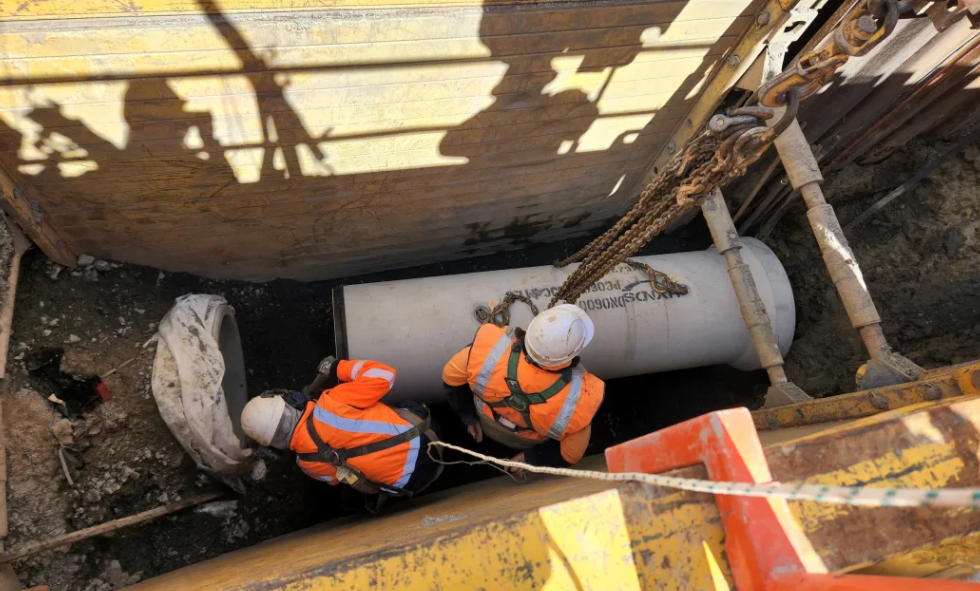The government has expanded fast-track consenting regime will set up an expert panel to give recommendations - but ministers will make the final decision.
Some projects will be included in the legislation - to be decided based on criteria set by ministers, during the select committee process - or developers can apply to the ministers of Infrastructure, Regional Development and Transport to have their project considered.
No projects have yet been decided on.
The expert panel will have six months at most to make their recommendations, with ministers able to require a shorter timeframe. Projects approved would be subject to conditions they must meet.
RMA Reform minister Chris Bishop and Regional Development Minister Shane Jones announced the plan at Wellington's Basin Reserve on Thursday, alongside Prime Minister Christopher Luxon and Transport Minister Simeon Brown.
Bishop said the system - based on the one set up under the last government to speed development during the Covid-19 response - would "cut through the thicket of red and green tape holding New Zealand back, make it clear to the world that we are open for business, and build a pipeline of projects around the country to grow the economy and improve our productivity".

A separate Fast Track Advisory Group of independent experts would be set up while the legislation is progressed to decide which projects will be included in the bill, with ministers to set criteria projects must meet. The ministers said the criteria and advisory group would be set "in the coming weeks".
It will allow fast-tracking of more than just resource consents, with other categories including notices of requirement, alterations to designations, compliance certificates, marine consents and aquaculture decisions, land access arrangements, archaeological applications, Conservation Act and Reserves Act concessions, and Wildlife Act approvals.
Some areas would continue to be protected, such as reserves, land returned under Treaty settlements if there was no written agreement with the owner, other customary Māori land and fisheries, and projects in the open ocean prohibited by international law.
The bill has been approved by Cabinet and set to have its first reading under urgency on Thursday afternoon, before being referred to a select committee. The ministers said it would also include a "more efficient mechanism for Public Works Act 1981 processes".
The fast-track scheme was one of the final tasks on the government's 100-day plan, the deadline for which is Friday.
Cabinet ministers agreed last year the new fast-track regime would prioritise regionally and nationally significant projects such as roads, mining and aquaculture, and allow ministers to refer projects to be fast-tracked if they met certain criteria.
Earlier, Housing Minister Chris Bishop told RNZ's Morning Report programme it would still have environmental protections.
"This is about fast track, this is not about getting rid of environmental protections or environmental conditions, so all of the projects we are looking at will go through an expert panel to apply conditions around the environment and all of the other relevant permits."
It also enables projects that are inconsistent with the RMA national direction to be approved.
The ministers would have broad powers to reject projects for fast-tracking, including over environmental effects.
The ministers will not be required to seek comment from the public or hold a hearing, although they - and the expert panel - must consult with relevant ministers, local authorities, and relevant Māori groups.
Only people with an interest in the decision greater than that of the general public would have the power to appeal the ministers' decisions on points of law at the High Court, but an accompanying document said it would not limit the right of judicial review.
'Red tape is strangling innovation'
Mining industry group Straterra chief executive Josie Vidal told Morning Report the current system was broken, and nobody was trying to get around the rules.
"The system is broken and it needs to be fixed. Mining is part of unlocking our economic growth, doing something fast doesn't mean doing it badly, and there is absolutely no suggestion that any of these projects, in the mining side, will be at the expense of the environment."
Vidal said environmental checks and balances remained in place and mining clients would keep the companies in check.
"It's red tape which is strangling innovation in this country. We've gone from a can-do to a whole bunch of people sitting round saying why you can't do things. It's 2024, we've got science, technology, engineering, we can fix problems."
It was misleading to say the changes would harm the environment, she said.
'Executive over-reach'
Green Party co-leader James Shaw had serious concerns about the legislation.
He told Morning Report it would override environmental protections that had been in place for decades.
"That is an extraordinary level of executive overreach and overriding all of the frankly very weak environmental protections that this country has had in place for decades."
Two bills that helped fast-track housing and infrastructure projects had been passed under the previous government already, he said.
Shaw said he understood today's legislation would come with a list of pre-approved projects, including one that had already been turned down by the Environment Court, and would allow ministers to approve projects which an expert panel would not be able to overturn.
"The idea that minister can personally say this project is going ahead no matter what, and the only thing that an expert panel can do is to apply conditions, is dramatically different to anything we've had since the Muldoon era."












